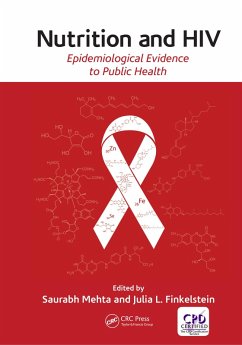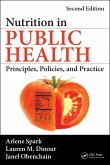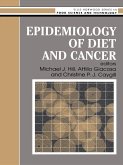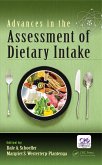Saurabh Mehta, Julia Finkelstein
Nutrition and HIV (eBook, PDF)
Epidemiological Evidence to Public Health
48,95 €
48,95 €
inkl. MwSt.
Sofort per Download lieferbar

24 °P sammeln
48,95 €
Als Download kaufen

48,95 €
inkl. MwSt.
Sofort per Download lieferbar

24 °P sammeln
Jetzt verschenken
Alle Infos zum eBook verschenken
48,95 €
inkl. MwSt.
Sofort per Download lieferbar
Alle Infos zum eBook verschenken

24 °P sammeln
Saurabh Mehta, Julia Finkelstein
Nutrition and HIV (eBook, PDF)
Epidemiological Evidence to Public Health
- Format: PDF
- Merkliste
- Auf die Merkliste
- Bewerten Bewerten
- Teilen
- Produkt teilen
- Produkterinnerung
- Produkterinnerung

Bitte loggen Sie sich zunächst in Ihr Kundenkonto ein oder registrieren Sie sich bei
bücher.de, um das eBook-Abo tolino select nutzen zu können.
Hier können Sie sich einloggen
Hier können Sie sich einloggen
Sie sind bereits eingeloggt. Klicken Sie auf 2. tolino select Abo, um fortzufahren.

Bitte loggen Sie sich zunächst in Ihr Kundenkonto ein oder registrieren Sie sich bei bücher.de, um das eBook-Abo tolino select nutzen zu können.
Nutritional management is integral to comprehensive HIV care and treatment. Improved nutritional status and weight gain can increase recovery and strength of individuals living with HIV/AIDS, improve dietary diversity and caloric intake, and improve quality of life. This book highlights evidence-based research linking nutrition and HIV and identifies research gaps to inform the development of guidelines and policies for the United Nations' Sustainable Development Goals.
- Geräte: PC
- ohne Kopierschutz
- eBook Hilfe
- Größe: 2.37MB
Andere Kunden interessierten sich auch für
![Micronutrients and HIV Infection (eBook, PDF) Micronutrients and HIV Infection (eBook, PDF)]() Micronutrients and HIV Infection (eBook, PDF)229,95 €
Micronutrients and HIV Infection (eBook, PDF)229,95 €![Nutrition in Public Health (eBook, PDF) Nutrition in Public Health (eBook, PDF)]() Arlene SparkNutrition in Public Health (eBook, PDF)47,95 €
Arlene SparkNutrition in Public Health (eBook, PDF)47,95 €![Epidemiology Of Diet And Cancer (eBook, PDF) Epidemiology Of Diet And Cancer (eBook, PDF)]() M. J. HillEpidemiology Of Diet And Cancer (eBook, PDF)239,95 €
M. J. HillEpidemiology Of Diet And Cancer (eBook, PDF)239,95 €![Physical Activity and Public Health Practice (eBook, PDF) Physical Activity and Public Health Practice (eBook, PDF)]() Physical Activity and Public Health Practice (eBook, PDF)187,95 €
Physical Activity and Public Health Practice (eBook, PDF)187,95 €![Advances in the Assessment of Dietary Intake. (eBook, PDF) Advances in the Assessment of Dietary Intake. (eBook, PDF)]() Advances in the Assessment of Dietary Intake. (eBook, PDF)48,95 €
Advances in the Assessment of Dietary Intake. (eBook, PDF)48,95 €![Barasi's Human Nutrition (eBook, PDF) Barasi's Human Nutrition (eBook, PDF)]() Michael Ej LeanBarasi's Human Nutrition (eBook, PDF)41,95 €
Michael Ej LeanBarasi's Human Nutrition (eBook, PDF)41,95 €![Cannabis as Medicine (eBook, PDF) Cannabis as Medicine (eBook, PDF)]() Betty Wedman-St. LouisCannabis as Medicine (eBook, PDF)61,95 €
Betty Wedman-St. LouisCannabis as Medicine (eBook, PDF)61,95 €-
-
-
Nutritional management is integral to comprehensive HIV care and treatment. Improved nutritional status and weight gain can increase recovery and strength of individuals living with HIV/AIDS, improve dietary diversity and caloric intake, and improve quality of life. This book highlights evidence-based research linking nutrition and HIV and identifies research gaps to inform the development of guidelines and policies for the United Nations' Sustainable Development Goals.
Dieser Download kann aus rechtlichen Gründen nur mit Rechnungsadresse in A, B, BG, CY, CZ, D, DK, EW, E, FIN, F, GR, HR, H, IRL, I, LT, L, LR, M, NL, PL, P, R, S, SLO, SK ausgeliefert werden.
Produktdetails
- Produktdetails
- Verlag: Taylor & Francis eBooks
- Seitenzahl: 352
- Erscheinungstermin: 15. Mai 2018
- Englisch
- ISBN-13: 9781351058186
- Artikelnr.: 56888624
- Verlag: Taylor & Francis eBooks
- Seitenzahl: 352
- Erscheinungstermin: 15. Mai 2018
- Englisch
- ISBN-13: 9781351058186
- Artikelnr.: 56888624
- Herstellerkennzeichnung Die Herstellerinformationen sind derzeit nicht verfügbar.
Saurabh Mehta, MBBS, ScD, is a physician with expertise in infectious disease, nutrition, epidemiology, and diagnostics. He trained in medicine at the All-India Institute of Medical Sciences in New Delhi, India, and then received his doctoral degree in epidemiology and nutrition from Harvard University in Cambridge, Massachusetts. He is currently an associate professor of global health, epidemiology, and nutrition in the Division of Nutritional Sciences at Cornell University in Ithaca, New York. The overarching focus of his research program is to identify, diagnose, and intervene on modifiable risk factors such as nutrition to improve population health, with advances in technological innovation being an integral component of his approach. His research is accomplished through a combination of active surveillance programs, development of smartphone diagnostics for nutrition and infection, and randomized controlled trials primarily in resource-limited settings in India, sub-Saharan Africa, and Latin America.
Julia L. Finkelstein, MPH, SM, ScD, is the Follett Sesquicentennial Faculty Fellow and assistant professor of epidemiology and nutrition in the Division of Nutritional Sciences, Cornell University. She is also an adjunct associate professor at St. John's Research Institute in Bangalore, India, and a Faculty Fellow at the Center for Geographic Analysis, Harvard University. She received her bachelor of science degree from McGill University, Montreal, Quebec; her master of public health degree from Brown University, Providence, Rhode Island; and master of science and doctor of science degrees in epidemiology and nutrition from Harvard University. Dr. Finkelstein is an epidemiologist with expertise in designing and conducting randomized clinical trials, cohort studies, and surveillance programs in resource-limited settings. Her research focuses on the intersection of micronutrients, infections, and maternal and child health. The goal of the Finkelstein Laboratory is to elucidate the role of micronutrients (i.e., iron, vitamin B12, and folate) in the etiology of infections and adverse pregnancy outcomes with the goal of improving the health of mothers and young children. This approach integrates nutrition, epidemiology, immunology, and biostatistics with an emphasis on the translation of laboratory findings and epidemiologic evidence to inform interventions and public health practice in at-risk populations. Dr. Finkelstein serves as an external expert with the World Health Organization (WHO) Nutrition Guidelines Group; as a core faculty member in the Pan American Health Organization/World Health Organization (PAHO/WHO) Collaborating Centre for Implementation Research in Nutrition and Global Policy; as an expert consultant for the WHO Vitamin and Mineral Information System Database, a global database of anemia and micronutrient biomarkers for all countries; and as an NIH reviewer for the National Institute of Diabetes and Digestive and Kidney Diseases (NIDDK).
Julia L. Finkelstein, MPH, SM, ScD, is the Follett Sesquicentennial Faculty Fellow and assistant professor of epidemiology and nutrition in the Division of Nutritional Sciences, Cornell University. She is also an adjunct associate professor at St. John's Research Institute in Bangalore, India, and a Faculty Fellow at the Center for Geographic Analysis, Harvard University. She received her bachelor of science degree from McGill University, Montreal, Quebec; her master of public health degree from Brown University, Providence, Rhode Island; and master of science and doctor of science degrees in epidemiology and nutrition from Harvard University. Dr. Finkelstein is an epidemiologist with expertise in designing and conducting randomized clinical trials, cohort studies, and surveillance programs in resource-limited settings. Her research focuses on the intersection of micronutrients, infections, and maternal and child health. The goal of the Finkelstein Laboratory is to elucidate the role of micronutrients (i.e., iron, vitamin B12, and folate) in the etiology of infections and adverse pregnancy outcomes with the goal of improving the health of mothers and young children. This approach integrates nutrition, epidemiology, immunology, and biostatistics with an emphasis on the translation of laboratory findings and epidemiologic evidence to inform interventions and public health practice in at-risk populations. Dr. Finkelstein serves as an external expert with the World Health Organization (WHO) Nutrition Guidelines Group; as a core faculty member in the Pan American Health Organization/World Health Organization (PAHO/WHO) Collaborating Centre for Implementation Research in Nutrition and Global Policy; as an expert consultant for the WHO Vitamin and Mineral Information System Database, a global database of anemia and micronutrient biomarkers for all countries; and as an NIH reviewer for the National Institute of Diabetes and Digestive and Kidney Diseases (NIDDK).
Introduction. HIV and Nutrition: Micronutrients. Vitamin A. B-complex.
Antioxidants - Vitamins C and E. Vitamin D. Selenium. Iron and Anemia.
Zinc. HIV and Nutrition: Macronutrients. Hunger/Food security.
Macronutrients. HIV/AIDS and Nutrition: Maternal and Child Health.
Micronutrients and HIV/AIDS in Pregnancy. Infant Feeding in the Context of
HIV. Pediatric HIV: Assessment, Screening, Support. HIV and Nutrition:
Public Health Practice. Co-infections - Tuberculosis and Malaria. Nutrition
and HIV in the Era of HAART. Case Studies from In-Country Perspective:
Senegal. Case Studies from In-Country Perspective: Zambia. Case Studies
from In-Country Perspective: India. Case Studies from In-Country
Perspective: Tanzania.
Antioxidants - Vitamins C and E. Vitamin D. Selenium. Iron and Anemia.
Zinc. HIV and Nutrition: Macronutrients. Hunger/Food security.
Macronutrients. HIV/AIDS and Nutrition: Maternal and Child Health.
Micronutrients and HIV/AIDS in Pregnancy. Infant Feeding in the Context of
HIV. Pediatric HIV: Assessment, Screening, Support. HIV and Nutrition:
Public Health Practice. Co-infections - Tuberculosis and Malaria. Nutrition
and HIV in the Era of HAART. Case Studies from In-Country Perspective:
Senegal. Case Studies from In-Country Perspective: Zambia. Case Studies
from In-Country Perspective: India. Case Studies from In-Country
Perspective: Tanzania.
Introduction. HIV and Nutrition: Micronutrients. Vitamin A. B-complex.
Antioxidants - Vitamins C and E. Vitamin D. Selenium. Iron and Anemia.
Zinc. HIV and Nutrition: Macronutrients. Hunger/Food security.
Macronutrients. HIV/AIDS and Nutrition: Maternal and Child Health.
Micronutrients and HIV/AIDS in Pregnancy. Infant Feeding in the Context of
HIV. Pediatric HIV: Assessment, Screening, Support. HIV and Nutrition:
Public Health Practice. Co-infections - Tuberculosis and Malaria. Nutrition
and HIV in the Era of HAART. Case Studies from In-Country Perspective:
Senegal. Case Studies from In-Country Perspective: Zambia. Case Studies
from In-Country Perspective: India. Case Studies from In-Country
Perspective: Tanzania.
Antioxidants - Vitamins C and E. Vitamin D. Selenium. Iron and Anemia.
Zinc. HIV and Nutrition: Macronutrients. Hunger/Food security.
Macronutrients. HIV/AIDS and Nutrition: Maternal and Child Health.
Micronutrients and HIV/AIDS in Pregnancy. Infant Feeding in the Context of
HIV. Pediatric HIV: Assessment, Screening, Support. HIV and Nutrition:
Public Health Practice. Co-infections - Tuberculosis and Malaria. Nutrition
and HIV in the Era of HAART. Case Studies from In-Country Perspective:
Senegal. Case Studies from In-Country Perspective: Zambia. Case Studies
from In-Country Perspective: India. Case Studies from In-Country
Perspective: Tanzania.







